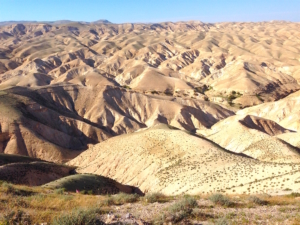Psalm 23 Revisited: How We Come Into the House of God

We all love Psalm 23. The image of being shepherded by the Great Shepherd through good and difficult times is comforting for the true believer. The first portion is idyllic. Read it again:
The Lord is my shepherd,
I shall not want.
He makes me lie down in green pastures;
He leads me beside quiet waters.
He restores my soul;
He guides me in the paths of righteousness
For His name sake.
But the second section brings in the element of danger. Let me make some comments on this portion.
Even though I walk through the valley of the shadow of death, I fear no evil, for You are with me; your rod and your staff, they comfort me.
The original readers and David himself, the author, had an image in mind as he wrote of “the valley of the shadow of death.” For much of the year, the work of the Bethlehemite shepherds took place in the Judean wilderness, just over the Mount of Olives above Jerusalem.
At first look, you might think there is no grass in the wilderness at all, but that isn’t so. A good shepherd can find that grass on the right side of the hill, and the running streams for the sheep to drink. But his guidance demands that they work their way through the undulating barren hills of the wilderness. These sharp valleys between the steep banks of the hills demand that the sheep sometimes go through valleys that are dark and foreboding. That would be hard enough, but more than likely the predators were watching above them for the perfect moment to strike. “Evil” may be translated, “evil one,” referring to the enemy of the sheep who would like to destroy them. Yet, because they are with the Shepherd who sees everything, they are at ease, knowing He will protect them. He will use the rod to fend off those predators, and the staff to hook and rescue unwise sheep. They are watched, protected, loved.
You prepare a table before me in the presence of my enemies; you have anointed my head with oil; my cup overflows.
This means that the Shepherd leads the sheep to luxuriant grass to provide the nourishment they need. He also pours on the oil that repairs the tears in their skin due to the thickets and sharp rocks, and even skirmishes with predators. It’s a happy life the sheep has, but still, enemies lurk about. The contrast between satisfaction and fear is dramatic.
Surely goodness and loving kindness will follow me all the days of my life, and I will dwell in the house of the Lord forever.
Up to death, the believer is protected by this loving Shepherd. God’s goodness and covenant mercy follow him, like ever aware sheep dogs. But then death comes. What is death for the believer? It is entering into the eternal house of God, which the Temple foreshadows. Bethlehem, the city of David’s youth, was a sheep city. It supplied the sheep for the Temple sacrifices. Those sheep entered the physical house of God to be sacrificed on the altar.
Throughout the believer’s life in Christ we are shepherded by the Good Shepherd, but death brings the believer into a better place—the perfect world of love—forever.

